Hey there, fellow dog lover! I’m Dr. Candy, your go-to holistic veterinarian. Today, let’s talk about your Bearded Collie’s dental health. I know, it’s not the most glamorous topic, but it’s a crucial one. You see, dental health is a key component of your Collie’s overall wellbeing. Just like in humans, poor dental hygiene in dogs can lead to serious health issues, including heart disease.
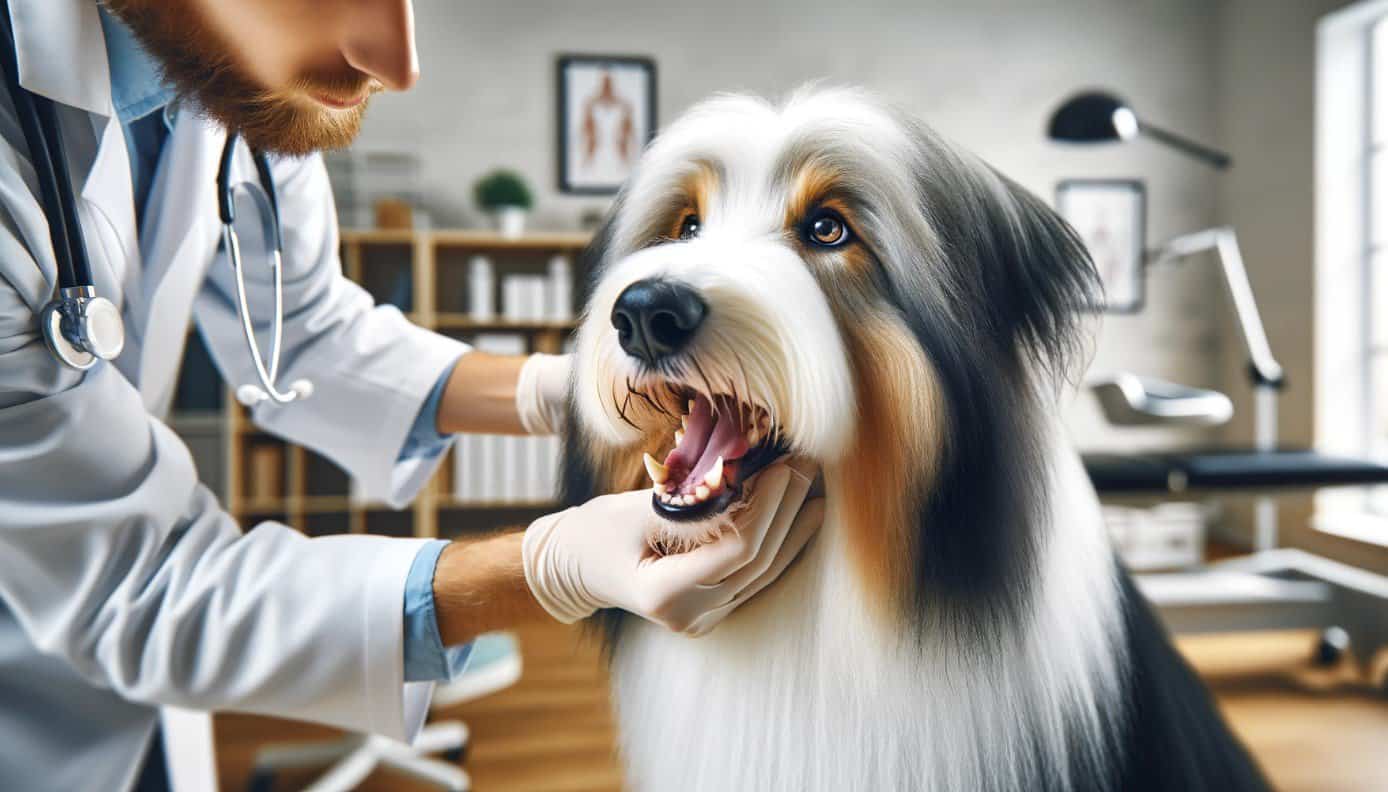
Bearded Collies, with their adorable fluffy faces, are prone to certain dental problems, which we’ll be discussing in this article. We’ll also explore conventional treatments, as well as my holistic approach to maintaining your Collie’s pearly whites. I’ll even share my top picks for dental chews and products specifically suited for Bearded Collies.
So, whether you’re dealing with bad breath, plaque build-up, or more serious dental issues, this comprehensive guide on Bearded Collie Dental Health is here to help. Remember, a healthy mouth equals a healthy, happy Bearded Collie!
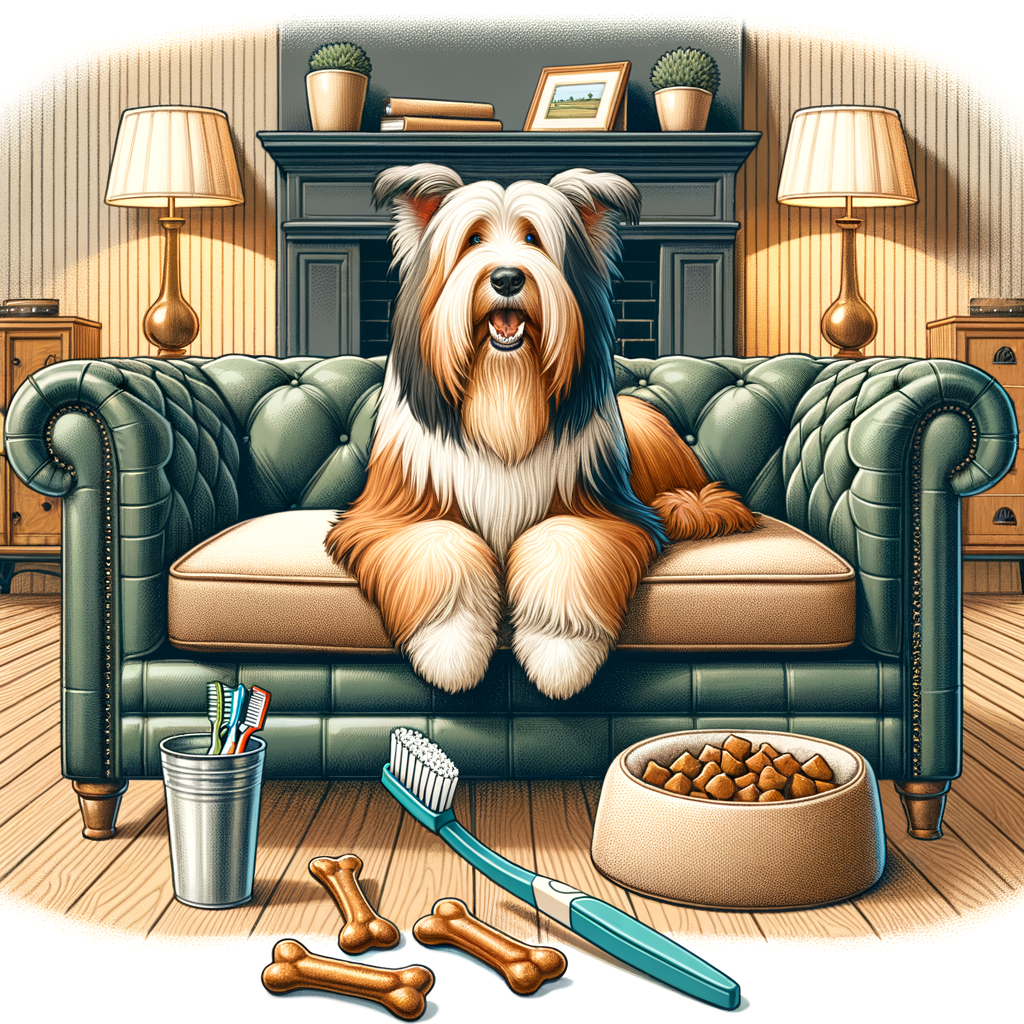
Signs of Dental Disease in Bearded Collie
As a loving parent to a Bearded Collie, it’s crucial to know the signs of dental disease. Just like humans, our furry friends can suffer from a range of dental health issues. The key to preventing serious complications is early detection and prompt treatment. Here, we’ll delve into the telltale signs of dental disease in your Bearded Collie, so you can ensure they maintain a happy and healthy smile.
Firstly, bad breath is more than just a nuisance—it’s often the first sign of dental disease. While it’s normal for your dog to have a certain doggy breath, an unusually foul odor might indicate a problem. Next, look out for changes in your Bearded Collie’s eating and chewing habits. If they’re eating less, dropping food, or chewing on one side, it could be due to oral discomfort.
Other signs include a sudden change in behavior, such as becoming more withdrawn or aggressive. Your pet might paw at their mouth or shake their head excessively. These could be indications of oral pain. Additionally, visible tartar buildup, red or swollen gums, and loose or missing teeth are clear signs of dental disease.
Don’t forget to pay attention to changes in your Bearded Collie’s drooling habits too. While some dogs are naturally more drooly, excessive drooling, especially if it’s tinged with blood, can be a sign of oral health issues.
Remember, Bearded Collies are known for their playful and lively nature. Any deviation from their normal behavior may indicate they are in discomfort. As a responsible dog parent, it’s crucial to familiarize yourself with these signs and monitor your pet’s oral health regularly. Regular check-ups with your vet are also a must to keep your Bearded Collie’s dental health in check.
Now that you know the signs of dental disease in Bearded Collie, you can take proactive steps to ensure your beloved pet’s oral health. Your vigilance combined with regular professional care can help prevent dental diseases and keep your Bearded Collie’s smile bright and healthy!
Common Dental Health Issues In Bearded Collie
When it comes to Bearded Collie dental health, there are several common issues that you, as a pet parent, should be aware of. This breed is prone to specific dental diseases, just like any other dog breed. Understanding these can help you take proactive steps to maintain your furry friend’s oral health.
- Periodontal Disease: This is the most common dental issue in Bearded Collies. It begins with plaque accumulation on the teeth, leading to inflamed gums and bad breath. If left untreated, it can cause tooth loss and serious health complications.
- Gingivitis: This is an early stage of periodontal disease and is characterized by red, swollen gums. It’s reversible with proper dental care, but if ignored, it can progress to a more severe condition.
- Broken Teeth: Bearded Collies love to chew, and this can lead to fractured or broken teeth. These can be painful and cause infections if not treated promptly.
It’s important to remember that these issues can be prevented with regular dental check-ups and good oral hygiene practices at home. Early detection is key to maintaining your Bearded Collie’s dental health, so don’t skip those vet appointments!
Next, we’ll explore conventional dental health treatments for Bearded Collies and how they can help address these common issues. Stay tuned!
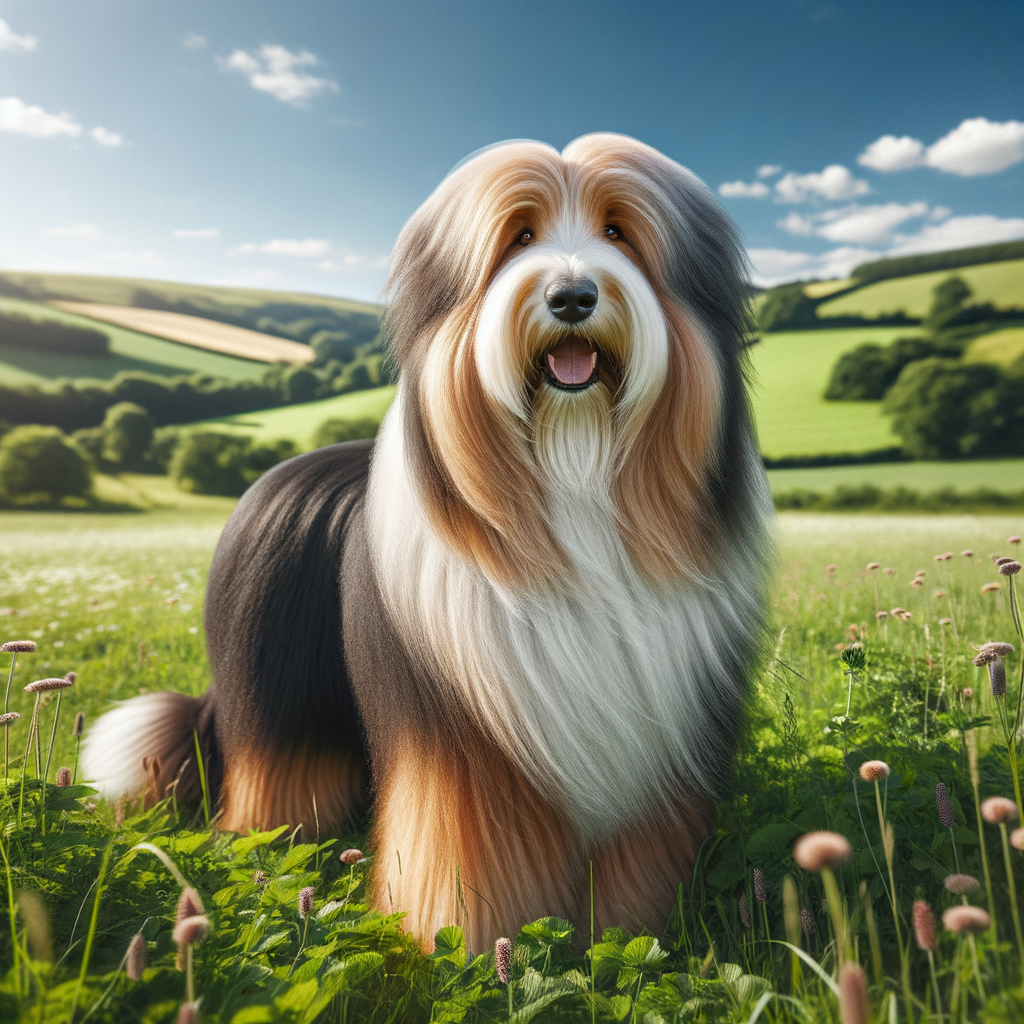
When it comes to Bearded Collie Dental Health, there are several conventional treatment methods that you can utilize to keep your furry friend’s teeth clean and healthy. One of the key procedures is the anesthetic dental cleaning.
Anesthetic Dental Cleanings
Anesthetic dental cleanings are considered the gold standard in pet dental care. This process involves placing your bearded collie under general anesthesia. The dental professional can then thoroughly clean below the gumline, where most dental disease occurs. They also have the opportunity to take x-rays and assess the health of the tooth roots and jawbone. Despite the benefits, it’s important to note that there are risks associated with anesthesia, especially for dogs with heart problems, drug sensitivities, seizures, or extreme age. Therefore, it is crucial to discuss these risks with your vet to ensure your collie’s safety.
Potential Individual Health Obstacles
When considering anesthetic dental cleanings, you should be aware of potential individual health obstacles. Some Bearded Collies may have heart conditions, making anesthesia riskier. Drug sensitivities can lead to adverse reactions, while seizures can be triggered by certain anesthetic agents. If your Bearded Collie is of extreme age, the risks associated with anesthesia may outweigh the benefits of a dental cleaning.
It’s important to discuss your dog’s overall health with your vet. They can perform tests to assess your dog’s risk and may suggest alternative treatments if anesthesia is deemed too risky. For instance, some vets may recommend non-anesthetic dental cleanings for older dogs or those with heart conditions. However, these cleanings are not as thorough and cannot clean below the gumline, so they should not be the sole method of dental care.
Remember, your Bearded Collie’s dental health is a crucial part of their overall wellbeing. Regular cleanings, whether anesthetic or non-anesthetic, combined with at-home care, can help keep your dog’s mouth healthy and their breath fresh.
Next, we will discuss Dr. Candy’s holistic approach to oral and dental health, which includes dietary considerations and the use of oral health-specific probiotics. Stay tuned for more tips on how to maintain your Bearded Collie’s sparkling smile!
Dr. Candy’s Holistic Approach to Dental Health
As a devoted Bearded Collie parent, I understand that your dog’s dental health is a top priority. That’s why I’m excited to share Dr. Candy’s holistic approach to oral and dental health for Bearded Collies. This approach focuses on two main areas: diet and oral health specific probiotics.
Diet – Low Carbs, Avoid Added Sugars, Enzymes In Fresh Food
One of the key components of maintaining your Bearded Collie’s dental health is their diet. A diet low in carbohydrates and free from added sugars can help prevent dental issues.
- Low Carbs: High-carbohydrate diets can lead to plaque build-up on your dog’s teeth. This can result in tartar formation, which can lead to periodontal disease. By feeding your Bearded Collie a diet low in carbohydrates, you can help reduce the risk of these dental issues.
- Avoid Added Sugars: Added sugars are not only unhealthy for your dog’s overall health, but they can also contribute to dental problems. Sugars can stick to your dog’s teeth, providing a food source for bacteria and leading to plaque formation.
- Enzymes In Fresh Food: Fresh foods, such as raw fruits and vegetables, contain natural enzymes that can help clean your dog’s teeth and promote good oral health. Consider adding fresh foods like apples, carrots, and celery to your Bearded Collie’s diet.
Oral Health Specific Probiotics
Another important aspect of Dr. Candy’s holistic approach to dental health is the use of oral health specific probiotics. Probiotics are beneficial bacteria that can help maintain a healthy balance of microorganisms in your dog’s mouth.
I highly recommend Probiora for Dogs, an oral health targeted probiotic. This product is specifically designed to support your dog’s oral microbiome, helping to keep their teeth and gums healthy. Just like with humans, a balanced oral microbiome in dogs can help prevent dental disease and bad breath.
Remember, maintaining your Bearded Collie’s dental health doesn’t have to be a chore. With a proper diet and the right supplements, you can help ensure your furry friend’s mouth stays healthy and clean. After all, a healthy mouth is a happy mouth!
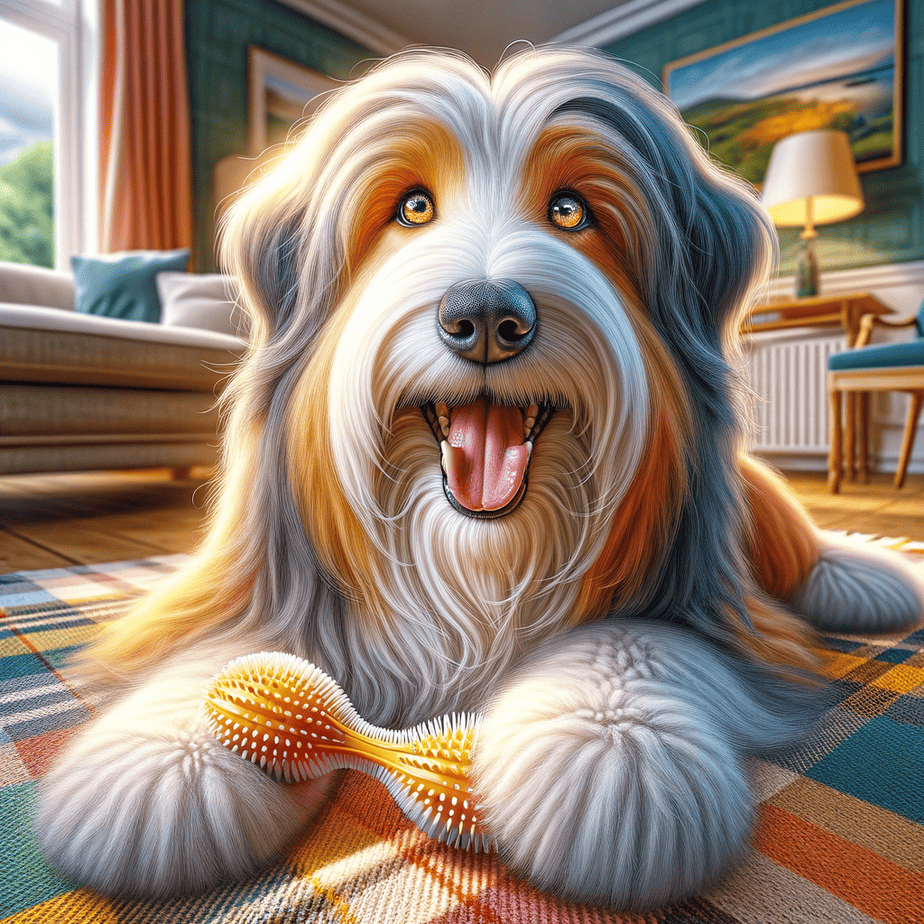
Recommended Dental Chews & Products For Bearded Collie
When it comes to Bearded Collie dental health, one of the most common misconceptions is that commercially promoted dental chews are the best solution. Sadly, not all dental chews are created equal, and many of the commercial options are packed full of unhealthy ingredients that can do more harm than good. They often contain artificial colors, flavors, and preservatives which can negatively impact your pet’s overall health and do not effectively clean your Bearded Collie’s teeth as they promise.
Another commonly recommended product for maintaining oral health in dogs are drinking water additives. While they might seem like a quick fix, they can actually harm the beneficial bacteria in your dog’s gut. These bacteria play a crucial role in digestion, immune function, and overall health, so it’s essential to keep them balanced.
So, what should you use instead? Here are some recommended dental chews and products that are not only healthier but also more effective in promoting good oral health in your Bearded Collie:
Tendons
Tendons are a fantastic natural chew for your Bearded Collie. They are tough and fibrous, which helps to scrape off plaque and tartar from your dog’s teeth. Plus, they are a good source of protein and collagen, promoting good joint health.
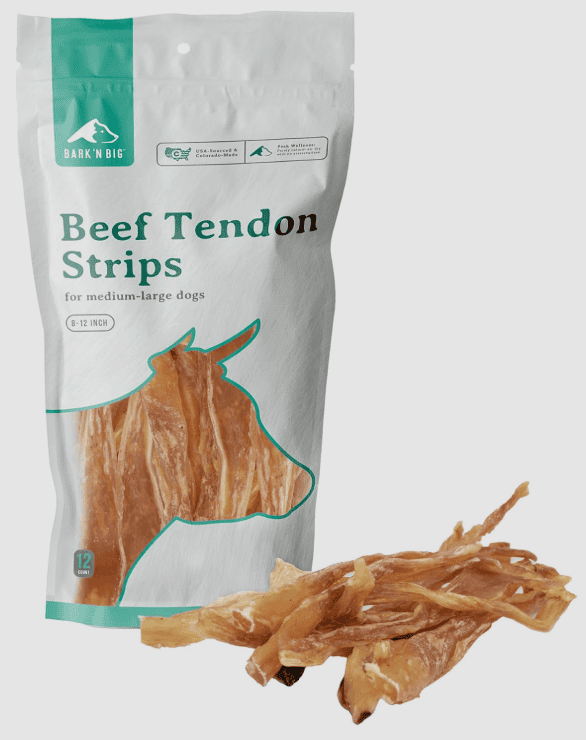
Raw Marrow Bones
Raw marrow bones are another excellent choice for maintaining your Bearded Collie’s dental health. They are a natural source of calcium and phosphorus, which are essential for healthy teeth and bones. Furthermore, the act of gnawing on bones can help to clean your dog’s teeth and gums.
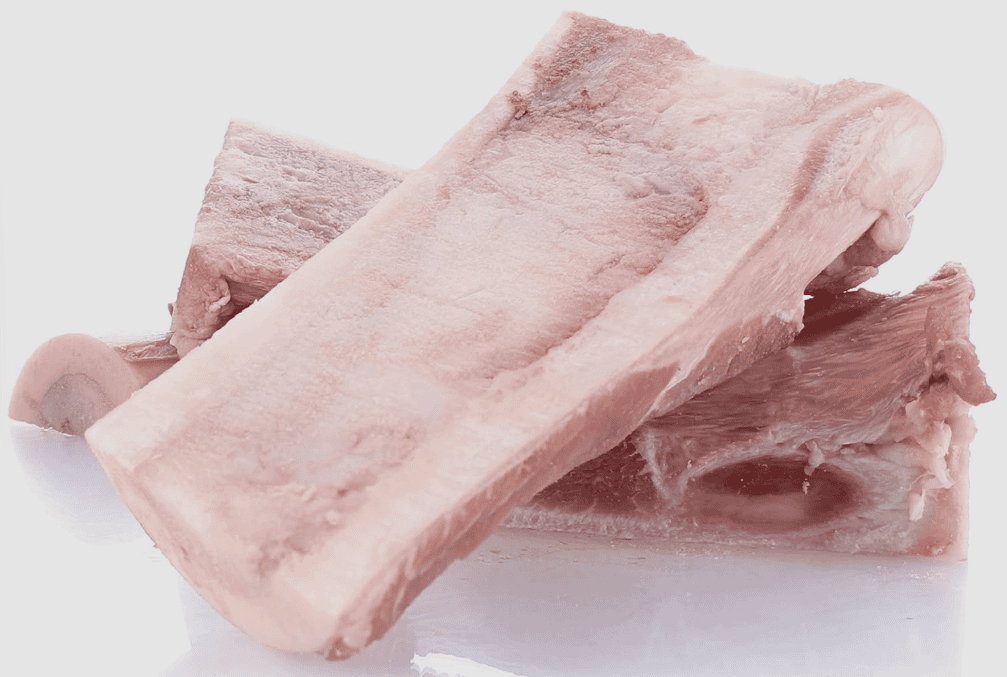
Bully Sticks
Bully sticks are made from 100% beef muscle, providing a natural and digestible chew for your dog. They can effectively remove plaque and tartar and are a good source of protein. However, always supervise your Bearded Collie while they’re chewing on a bully stick to prevent any choking hazard.
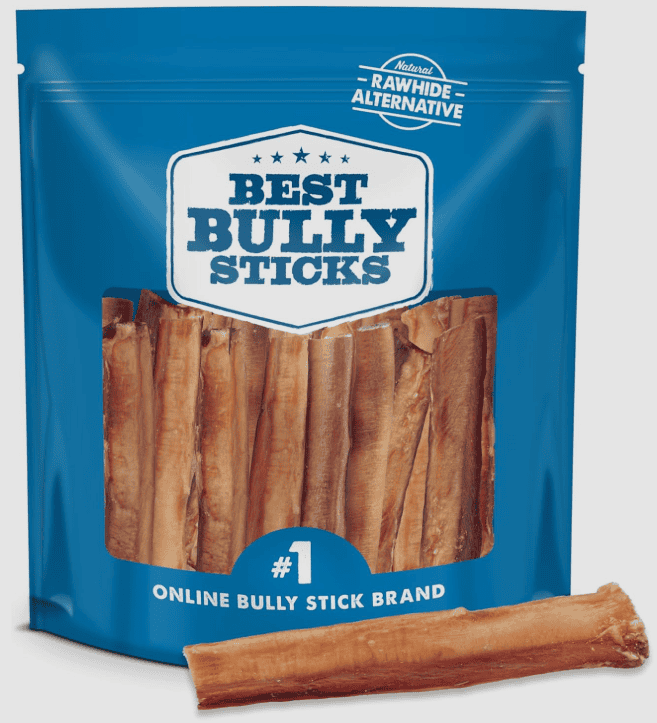
Remember, maintaining your Bearded Collie’s dental health is a multifaceted approach that includes a balanced diet, regular vet checks, and effective oral hygiene practices. Using the right chews and products can make a world of difference in your pet’s oral health and overall wellbeing.
Frequently Asked Questions
1. How can I prevent bad breath in my Bearded Collie?
Regular brushing of your Bearded Collie’s teeth is essential to prevent bad breath. Use a dog-specific toothbrush and toothpaste to clean their teeth at least 2-3 times a week. Additionally, providing dental chews or toys can help remove plaque and freshen their breath.
2. What are some signs of dental problems in Bearded Collies?
Some common signs of dental problems in Bearded Collies include bad breath, swollen or bleeding gums, yellow or brown tartar buildup, difficulty eating, pawing at the mouth, and excessive drooling. If you notice any of these signs, it is important to consult a veterinarian.
3. Can diet affect my Bearded Collie’s dental health?
Absolutely! Feeding your Bearded Collie a balanced diet that includes high-quality dog food can contribute to their dental health. Dry kibble can help remove plaque as they chew, while some specially formulated dental diets can also promote oral hygiene.
4. Are there any specific dental care products recommended for Bearded Collies?
Yes, there are several dental care products recommended for Bearded Collies. Look for toothbrushes and toothpaste designed specifically for dogs. Additionally, dental chews, water additives, and oral gels can be beneficial in maintaining their dental health. Always choose products that are safe for dogs and consult your veterinarian for recommendations.
5. How often should I take my Bearded Collie for professional dental cleanings?
Professional dental cleanings should be done by a veterinarian at least once a year. However, the frequency may vary depending on your Bearded Collie’s individual dental health and the recommendation of your veterinarian. Regular check-ups will help identify if more frequent cleanings are necessary.
